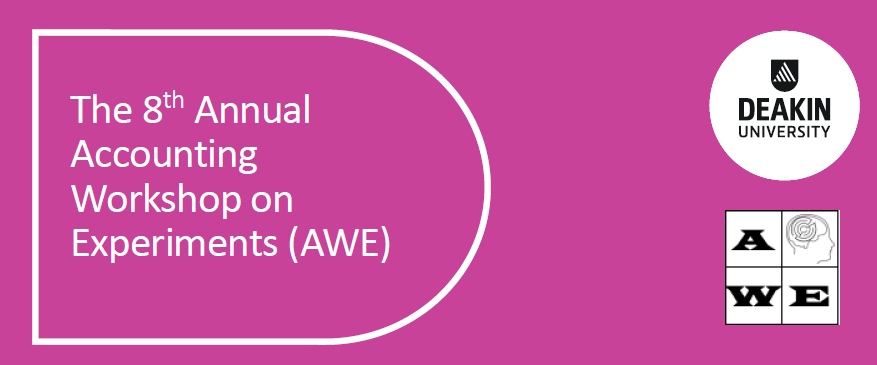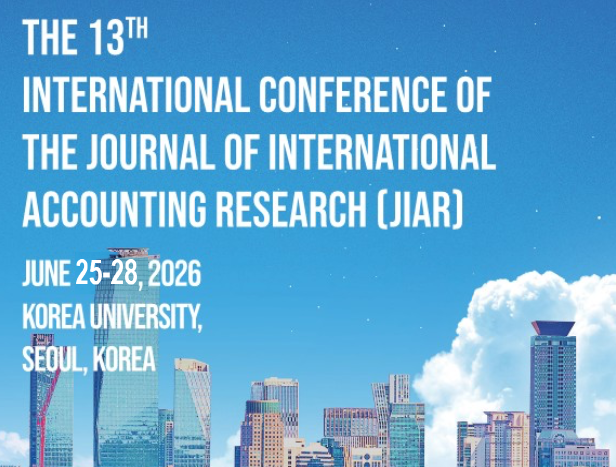Please see below a list of Call for Papers

We are pleased to announce the 8th Annual Accounting Workshop on Experiments (AWE). The main conference is to be held on Friday 29 May 2026 at Deakin University, Melbourne Downtown Corporate Centre.
The keynote address will be presented by Professor Jeffrey Hales, the University of Texas at Austin. Professor Hales is a leading researcher in accounting and sustainability, and a
member of the International Sustainability Standards Board (ISSB). The main conference will be preceded by the doctoral forum on the afternoon of Thursday 28 May 2026, with a masterclass conducted by Professor Michael Davern, the University of Melbourne.
AWE seeks papers that employ experiments to investigate accounting questions. Early-stage papers are particularly encouraged. Submitted work must represent original work that has not been published or accepted for publication in a journal. At least one author for every accepted paper must register for AWE and be prepared to present at the main conference. Paper submission date is 6 March 2026.
For all details, click HERE

Save the Date!
The goal of this conference is to expand the diversity and scope of international accounting research, through increased understanding and awareness of the challenges and opportunities of international accounting. Original and rigorous research will provide academics, practitioners, and regulators with deeper insights into international accounting issues. Journal of International Accounting Research (JIAR) continues to welcome innovative and high-quality research that examines how accounting data affects capital market participants. Papers that address interesting and innovative research questions in all areas are welcomed. Papers can be submitted for consideration in one of two tracks: Plenary Session submissions or Concurrent Session submissions.
All details are available HERE
Announcing AAAJ’s APIRA 2028 – Suva, Fiji
The Asia-Pacific Interdisciplinary Research in Accounting (APIRA) 2028 conference and its Emerging Scholars' Colloquium returns to its traditional AAAJ management, philosophy, format and scope, convening for the first time in APIRA’s long history, in Suva Fiji in the South Pacific.
APIRA hosts are The University of the South Pacific (USP) School of Accounting, Finance and Economics (SAFE) in association with Accounting, Auditing & Accountability Journal (AAAJ).
The APIRA conference will take place on 11-13 July 2028 and its Emerging Scholars’ Colloquium will take place on 10 July 2028. Both will be convened on USP’s Suva campus
The website for the conference can be found at: https://www.usp.ac.fj/usp-safe/apira-conference/
Our Fiji location is an exciting step for APIRA and AAAJ as we continue to develop the interdisciplinary accounting research community across the Asia Pacific region and globally.
Please include this conference, its website and dates in your forward planning diaries. We look forward to meeting with you in Suva, Fiji, 2028!
Professors Lee Parker & James Guthrie - AAAJ Editors - Glasgow & Macquarie Universities
Professor Sumit Lodhia – Co-Director Centre for Markets, Values & Inclusion - University of South Australia
Professor Gurmeet Singh – Deputy Vice-Chancellor - The University of the South Pacific

Special issue - Call for papers
Sustainable Development Goals (SDGs): Management, reporting, and assurance to address social and environmental challenges
Guest Editors:
Sumit Lodhia (Adelaide University, Adelaide, Australia)
Amanpreet Kaur (Adelaide University, Adelaide, Australia)
Nathalie Crutzen (HEC Liège, ULiège, Liège, Belgium)
The United Nations established the SDGs in 2015. These represent 17 global goals and 169 associated targets (UN, 2015). Organisations are impacted by these goals, and they have responded through their management, reporting and assurance processes (Lodhia, 2025, Lodhia et al, 2023 2025, Kaur et al, 2025) to address systemic societal and environmental challenges (Dimes et al, 2025, Grana et al, 2025). However, existing research has touched the surface only and there is scope for exploring the management, reporting and assurance of the SDGs in greater depth (Bebbington and Unerman, 2018, 2020), given that more than a decade has elapsed since these goals were formulated. This Special Issue is an opportunity to bring together research that addresses how organisations have responded to the SDGs since their inception.
Organisations respond to their sustainability challenges internally (sustainability management) and externally (sustainability reporting) (Lodhia, 2013). Assurance provides credibility to these processes (Farooq and de Villiers, 2019, 2020). Thus, the development of SDGs management, reporting and assurance is critical and provides an understanding of how organisations respond to these goals.
SDGs impact most organisations, including corporations (Lodhia et al, 2023), the public sector (Kaur et al, 2025, Lodhia et al, 2025), and other institutions such as NGOs, B-Corps, charities, social enterprises, universities and hybrid organisations (Lodhia, 2025). An understanding of SDGs management, reporting and assurance overall in specific sectors or across the sectors is lacking. Research approaches such field research encompassing methods such as interviews, content analysis, observation and focus groups are needed to understand the context within which management, disclosure and assurance of SDGs takes place. It is also essential to consider country specific and regional studies into SDGs management, reporting and assurance in order to understand the similarities and differences in these practices.
There is also a need to explore specific SDGs, as each of the 17 goals aims to address a distinct social, environmental or economic issue affecting global communities. Moreover, the SDGs are inherently interconnected, whereby progress in one area can generate cascading effects, either beneficial or adverse on others (Nilsson et al, 2018). Despite this complexity, the interrelationships among the goals remain largely underexplored in current research and practice. Hence, it becomes worth exploring how organisations address specific goals and whether a tradeoff is involved in addressing the goals.
There is indeed further scope for expanding our knowledge base in relation to the management, reporting and assurance of the SDGs and this special issue attempts to address this. Potential issues to consider in this special issue include, but are not limited to, the following:
- The management of SDGs by organisations, the organizational and behavioral processes involved, and the measurement of SDGs.
- The disclosure of SDGs, the motivations for such disclosures and the links with internal processes.
- The assurance for SDGs and the role of auditors in this process.
- The role of stakeholders in management, reporting and assurance of SDGs, stakeholder perceptions of corporate SDGs practices, and stakeholder engagement processes
- The role of modern technologies (such a blockchain and artificial intelligence) in SDGs management, disclosure and assurance
- The use of social media for corporate information dissemination on SDGs
- The impact of the Covid pandemic on SDGs management, reporting and assurance.
- The impact of regulatory requirements on the management, disclosure and assurance of SDGs
- Partnerships between organisations for the management, reporting and assurance of SDGs
- Rainbow washing of SDGs management, disclosure and assurance.
Submission deadline: 28th February 2026.
Papers should be submitted through the journal’s online submission system at https://mc.manuscriptcentral.com/medar choosing the SDG special issue in step 5 of the submission process.

We invite submissions for a special issue of Pacific Accounting Review dedicated to advancing research in accounting education with a focus on the Pacific region. This region presents a rich educational landscape, offering unique accounting educational challenges and opportunities that merit deeper exploration.
This special issue aims to highlight innovative and forward-thinking approaches to accounting education that are of relevance to the Pacific region.
Guest editor(s): Nicola Beatson, James Wakefield
For all information and submission details, go to Accounting Education in the Pacific Region: Challenges, Innovations, and Future Directions | Emerald Publishing
Opening date for manuscripts submissions: 16th March 2026
Closing date for manuscripts submission: 14th September 2026

Accounting History is pleased to announce that the 13th Accounting History International Conference (AHIC) will be hosted by the University of Wollongong, Australia from 8-11 July 2026. We invite scholars, practitioners, and researchers to contribute to “Accounting through the ages: Lessons for modern challenges,” a conference that bridges our rich accounting heritage with contemporary challenges. You can view conference details HERE, and paper submissions are open HERE with a closing date of 13th Feb 2026. The Call for Paper document can be downloaded HERE.
Special Issue: ‘Accounting and Totalitarianism in an Historical Perspective’: Accounting History invites historically grounded scholarship that interrogates the many ways accounting has intersected with, enabled, resisted, or been transformed by totalitarian projects understood as a form of rule that seeks to penetrate and re-engineer every sphere of collective and private life. The closing date for submissions is 31 July 2026. The Call for Paper document can be downloaded HERE.
Special Issue: ‘Accounting History - Women and Accounting's Past’ invites submissions that seek to expand and deepen the body of scholarship on women and accounting. The closing date for submissions is 28 September 2026. The Call for Paper document can be downloaded HERE.

Call for Papers - ISAR 2026
30th Annual International Symposium on Audit Research
The 30th Annual International Symposium on Audit Research (ISAR) will be hosted by Maastricht University on 19–20 June 2026 at the Crowne Plaza Hotel in Maastricht.
Call for Papers
We invite you to submit a paper for presentation at the 30th ISAR. The scope of ISAR is broad and includes research papers and panels that deal with all aspects of auditing and assurance. Papers that utilize any of a broad range of research methodologies will be considered.
Submission Information & Guidelines
Papers and, where applicable, related research instruments, should be submitted electronically in Adobe Acrobat or Word formats through our online paper submission link below by 1 February 2026.
Submitted papers should follow the style guidelines of Auditing: A Journal of Practice & Theory. Please pay particular attention to the format and length requirements - the body of the manuscripts should not exceed 7,000 words or approximately 20–25 double-spaced pages. Submitted papers should include an abstract and a title page containing the paper's title and authors' names and affiliations. Accepted papers will be made available to participants before the conference but will not be published in formal proceedings and thus may be submitted to any appropriate journal for publication.
Online Paper Submission:
Please submit papers here.
(If you encounter any technical problems with the Paper Submission System, please email us at isar-sbe@maastrichtuniversity.nl)
Further Information
Further information on ISAR 2026 will be made available at http://isarhq.org/ISAR2026.html.
For questions about the symposium please contact Marieke Feijs at
isar-sbe@maastrichtuniversity.nl